
Pyrrhocoridae is a family of insects with more than 300 species world-wide. Many are red coloured and are known as red bugs and some species are called cotton stainers because their feeding activities leave an indelible yellow-brownish stain on cotton crops. A common species in parts of Europe is the firebug, and its genus name Pyrrhocoris and the family name are derived from the Greek roots for fire "pyrrho-" and bug "coris". Members of this family are often confused with, but can be quickly separated from, Lygaeidae by the lack of ocelli on the top of the head.

The western conifer seed bug, sometimes abbreviated as WCSB, is a species of true bug (Hemiptera) in the family Coreidae. It is native to North America west of the Rocky Mountains but has in recent times expanded its range to eastern North America, to include Ontario, New Brunswick, Nova Scotia, Maine, Pennsylvania, New York, Connecticut, Massachusetts, and New Hampshire, and has become an accidental introduced species in parts of Europe and Argentina.
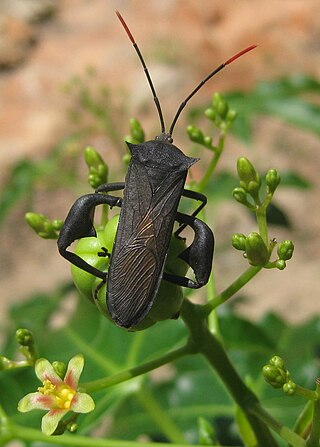
Coreidae is a large family of predominantly sap-sucking insects in the Hemipteran suborder Heteroptera. The name "Coreidae" derives from the genus Coreus, which derives from the Ancient Greek κόρις (kóris) meaning bedbug.

Alydidae, commonly known as broad-headed bugs, is a family of true bugs very similar to the closely related Coreidae. There are at least 60 genera and 300 species altogether. Distributed in the temperate and warmer regions of the Earth, most are tropical and subtropical animals; for example Europe has a mere 10 species, and only 2 of these occur outside the Mediterranean region.

Carpocoris mediterraneus, the red shield bug, is a species of shield bug in the family Pentatomidae.
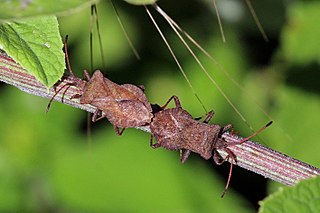
Coreus marginatus is a herbivorous species of true bug in the family Coreidae. It is commonly known as the dock bug as it feeds on the leaves and seeds of docks and sorrels. It is a medium-sized speckled brown insect, between 13 and 15 mm long as an adult, with a broad abdomen. It occurs throughout Europe, Asia and northern Africa. It is often found in dense vegetation, such as hedgerows and wasteland.

Coreinae is a subfamily in the hemipteran family Coreidae. They have been shown to be paraphyletic with respect to Meropachyinae.

Anisoscelini is a tribe of leaf-footed bugs in the family Coreidae. It was formerly spelled Anisoscelidini, but the tribal name spelling was incorrectly formed.
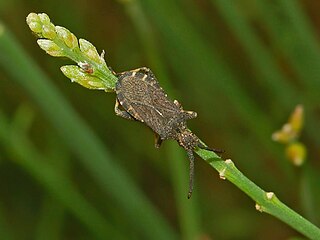
Bothrostethus annulipes is a species of Coreidae family, subfamily Pseudophloeinae.

Centrocoris spiniger is a species of family Coreidae, subfamily Coreinae.
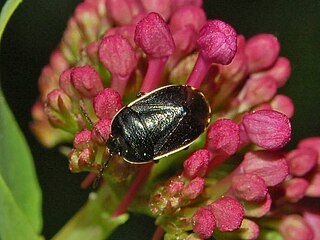
Canthophorus dubius is a species of burrowing bugs or negro bugs belonging to the family Cydnidae, subfamily Sehirinae.
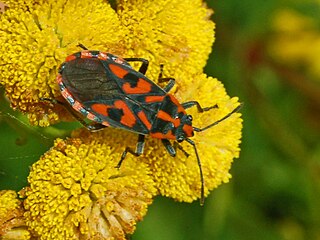
Spilostethus saxatilis is a species of bugs belonging to the family Lygaeidae, subfamily Lygaeinae.
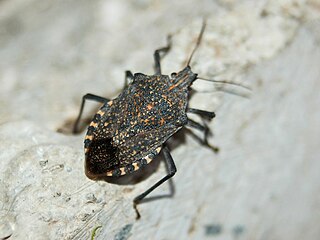
Apodiphus amygdali is a species of shield bug belonging to the family Pentatomidae, subfamily Pentatominae.
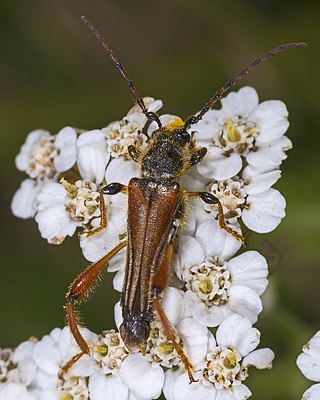
Stenopterus rufus is a beetle species of round-necked longhorns belonging to the family Cerambycidae, subfamily Cerambycinae.

Carpocoris pudicus is a species of shield bug in the family Pentatomidae.

Camptopus lateralis, common name broad-headed bug, is a species of true bugs of the family Alydidae, subfamily Alydinae.
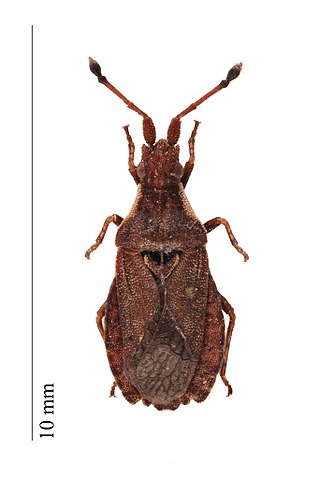
Spathocera dalmanii, known as Dalman's leatherbug, is a species of insect in the family Coreidae, tribe Coreini. It is native to Europe.

Megalonotus praetextatus is a species of seed bug in the family Rhyparochromidae.

Nagusta goedelii is a species of assassin bugs in the family Reduviidae.

Dipsocoridae are a family of heteropteran bugs known as jumping ground bugs. There are about 30 widely distributed species which are placed in three genera. Fossils from Eocene amber have also been placed in the family.




















